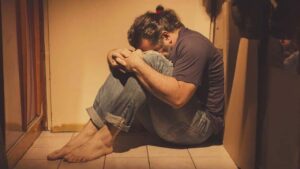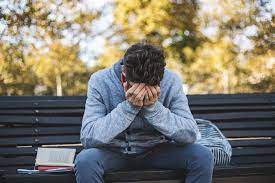If you have been through a traumatic event, you may be struggling with something called complex PTSD. Complex PTSD is a more severe form of PTSD that can occur when someone has experienced multiple traumatic events. If you are feeling overwhelmed and don’t know where to turn, this blog post is for you. In it, we will discuss what complex PTSD is, and how you can get help for yourself or a loved one.
Contents
What Is Complex PTSD?
Most common ly people are familiar with the term PTSD and anxieties. But what many don’t realize is that there are different types of PTSD. And one such common type is called complex PTSD. Complex PTSD (C-PTSD) is a condition that can develop after facing prolonged and repeated trauma. Such as domestic violence, human trafficking, or living in a war zone.
ly people are familiar with the term PTSD and anxieties. But what many don’t realize is that there are different types of PTSD. And one such common type is called complex PTSD. Complex PTSD (C-PTSD) is a condition that can develop after facing prolonged and repeated trauma. Such as domestic violence, human trafficking, or living in a war zone.
It’s also sometimes referred to as a “disorder of extreme stress not otherwise specified” (DESNOS). C-PTSD is a little different from regular PTSD in that it involves more complex symptoms. And the effects often last much longer.
Moreover, this complex PTSD is often accompanied by a feeling of helplessness and a loss of control. If you’re suffering from C-PTSD, it’s likely that you feel disconnected from yourself and others. You may also have problems with managing your emotions, which can lead to outbursts or numbing yourself altogether.
According to studies, complex PTSD is more likely to occur in women than men. This is likely because women are more likely to experience the types of trauma that can lead to C-PTSD. However, this condition is not gender-specific and can happen to anyone.
If you think you might be suffering from C-PTSD, it’s important to get help. There are several options available that can help you.
Signs And Symptoms Of Complex PTSD
The signs and symptoms of complex PTSD are several, these are discussed below:
Re-experiencing the trauma
Re-experiencing the trauma is when you have intrusive thoughts or flashbacks about the event. You may feel like you are going through the experience again. You may also have nightmares. This largely includes:
- intrusive thoughts or images,
- flashbacks, and
- nightmares.
In fact, it is believed that re-experience of the trauma is one of the main symptoms that separate complex PTSD from regular PTSD.
Negative changes in beliefs and feelings
With complex PTSD, you may have negative changes in your beliefs and feelings. For example, you may lose trust in people. You may also feel guilty or ashamed about what happened to you. You might even feel like the world is completely dangerous. Also, your self-esteem may go down and you might have trouble feeling close to other people. All these factors together can make it hard to keep a job or be in a relationship.
Changes in emotions and mood
You may also have big changes in your emotions and mood. For example, you might become more irritable, aggressive, or even violent. You might have a hard time controlling your emotions. You may also feel numb and cut off from your feelings. Some people with complex PTSD may even try to hurt themselves on purpose.
Avoidance And Numbing
 With complex PTSD, you may try to avoid anything that reminds you of the trauma. This can make it hard to talk about what happened or even think about it. You may also try to avoid people, places, and activities that remind you of the trauma. This may make it hard to do things you once enjoyed. This symptom is a combination of avoidance and numbing symptoms.
With complex PTSD, you may try to avoid anything that reminds you of the trauma. This can make it hard to talk about what happened or even think about it. You may also try to avoid people, places, and activities that remind you of the trauma. This may make it hard to do things you once enjoyed. This symptom is a combination of avoidance and numbing symptoms.
You may not want to talk about the trauma or even think about it. You may also try to numb yourself with drugs, alcohol, or food. This can lead to problems with your job, family, and friends. Also, this can make it hard to get help for your PTSD.
A feeling of being on edge
The feeling of being on edge is when you are constantly in a state of alert. You may be jumpy or easily startled. This can also include:
- difficulty sleeping,
- irritability or anger, and
- hypervigilance.
This is often one of the most disabling symptoms of complex PTSD.
Changes in emotional reactions
With complex PTSD, you may have a hard time with emotional reactions. For example, you may have problems with:
- concentration,
- memory,
- mood swings,
- and impulsiveness.
These emotional reactions can make it hard to do well at work or school. They can also make it hard to keep a job or be in a relationship.
So, these are some common symptoms of complex PTSD. It is essential for you to know these signs so that you can get the help that you need. If you are experiencing any of these symptoms, please reach out to a mental health professional for help.
What Causes Complex PTSD?
The causes are actually not found completely as research is ongoing. However, we do know that it develops in individuals who experience extended and repeated trauma during childhood. However, studies have found that certain events affect the brain and nervous system in a way that can lead to the development of complex PTSD.
One theory is that the individual has a genetic predisposition to developing the disorder. This means that they are more likely to develop it after exposure to trauma than someone without the predisposition.
The traumas can be physical, emotional, or sexual abuse, neglect, witnessing violence, or any situation where there is a perceived threat to life or safety. Moreover, the causes are not limited to traumas experienced in childhood. Any type of trauma experienced at any age can lead to the development of complex PTSD.
So, if you have experienced any type of trauma, it is important to be aware of the symptoms and seek help if necessary.
What Are Some Risk Factors?
 If you are already struggling with mental health issues, you may be more likely to develop complex PTSD. Other risk factors include:
If you are already struggling with mental health issues, you may be more likely to develop complex PTSD. Other risk factors include:
- Experiencing multiple traumas
- Being a child when the trauma(s) occurred
- Having a close relationship with the person who caused the trauma(s)
- Not having a supportive environment after the trauma(s)
- Having preexisting mental health issues
Complex PTSD can be tough to deal with, but help is available. Also, the risk factors that are associated with developing the condition are not set in stone. If you have experienced trauma, it does not mean that you will develop complex PTSD. And even if you do develop the condition, there is still hope for recovery.
However, this condition is likely to cause a lot of suffering. If you think you might have complex PTSD, it is important to reach out for help. Then, you must follow through with treatment to give yourself the best chance for recovery. Treatment will likely involve talk therapy and, in some cases, medication. You may also find support groups helpful. Complex PTSD is a serious condition, but there is help available.
How Does It Impacts Life?
It is not uncommon for people with complex PTSD to have symptoms of depression, anxiety, and post-traumatic stress disorder (PTSD). This impacts life to the point where functioning in day-to-day life is difficult. Some of the negative impacts include:
Poor physical health
When you are constantly in a state of fight-or-flight, your body is under immense stress. This can lead to physical health problems such as:
- Chronic pain
- Digestive issues
- Heart disease
- Obesity
- Problems with the immune system
- Autoimmune diseases
- Migraines and headaches
- Fatigue
- Difficulty sleeping or insomnia
The problems are numerous and really disappointing.
Troubled relationships
The majority of people with complex PTSD have difficulty in their personal relationships. The symptoms make it hard to trust others, be intimate, and feel close to someone. It’s not uncommon for people with complex PTSD to isolate themselves and push away the people they love. Moreover, they might engage in risky behaviors or have problems with substance abuse.
Problems with work or school
When you are dealing with the symptoms of complex PTSD, it can be hard to focus or concentrate. This might lead to problems at work or school. It’s not uncommon for people with complex PTSD to have a hard time keeping a job or completing their education. In fact, many people with complex PTSD end up unemployed or underemployed.
Substance abuse
This is one of the most common consequences of complex PTSD. People might turn to drugs or alcohol to numb the pain or escape the reality of their lives. This can lead to addiction and other problems such as financial instability, legal trouble, and relationship problems. In fact, it is common for most people with mental health disorders to develop a substance use disorder at some point in their lives.
Self-harm or suicidal thoughts
 People usually take complex PTSD as normal and develop a negative view of themselves. They might think that they are not good enough or that they deserve the pain they are going through. This can lead to self-harm or suicidal thoughts. If you are having these thoughts, it is important to get help from a mental health professional immediately.
People usually take complex PTSD as normal and develop a negative view of themselves. They might think that they are not good enough or that they deserve the pain they are going through. This can lead to self-harm or suicidal thoughts. If you are having these thoughts, it is important to get help from a mental health professional immediately.
Complex PTSD can have a profound impact on your life. If you are struggling with the symptoms, it is important to get help from a mental health professional. With treatment, you can learn to manage your symptoms and live a full and satisfying life.
How To Treat It?
When you realize that you have complex PTSD, it can be a very daunting realization. It can feel like there is no hope and that you will never recover. However, this is not the case. There are many ways to treat complex PTSD and with the right help, you can recover and live a happy life.
There are many different types of treatment available for complex PTSD. These include:
Therapy
This is the prominent thing you should consider when seeking help for complex PTSD. There are many different types of therapy available and your therapist will be able to help you find the right one for you. Some common types of therapy used to treat complex PTSD are:
- Cognitive-Behavioural Therapy (CBT): This type of therapy focuses on helping you change the negative thoughts and behaviors that are associated with your complex PTSD.
- Trauma-Focused Therapy: This type of therapy focuses on the trauma that you have experienced and helps you to process it in a healthy way.
- Eye Movement Desensitisation and Reprocessing (EMDR): This is a type of therapy that uses eye movements to help you process the trauma you have experienced.
These therapies are just a few of the many that are available to help you treat your complex PTSD. If you are struggling, please seek professional help as they will be able to guide you to the right type of therapy for you.
Medication
Sometimes, medication is also prescribed alongside therapy to help treat complex PTSD. This is because some of the symptoms of complex PTSD, like anxiety and depression, can be managed with medication. Medication can also help manage flashbacks and intrusive thoughts.
If you’re considering medication for complex PTSD, it’s important to talk to a mental health professional about what medications might be right for you and whether there are any potential risks or side effects.
There are a variety of medications, some of these include:
- Selective serotonin reuptake inhibitors (SSRIs)
- Serotonin and norepinephrine reuptake inhibitors (SNRIs)
- Tricyclic antidepressants (TCAs)
- Monoamine oxidase inhibitors (MAOIs)
- Benzodiazepines
Support Groups
Another great way to get help for complex PTSD is by joining a support group. This can be an online or in-person group and it provides you with a space to share your experiences with others who understand what you are going through. Support groups can be a great way to feel less alone and can provide you with practical tips and advice for dealing with your symptoms.
If you are interested in finding a support group, you can ask your therapist for recommendations or search online for groups in your area.
Another great way to get help is by joining a specialized support group. This can be an online or in-person group that provides you with a space to share your experiences with others who understand what you are going through.
Herbal Remedies
These days, it seems like there’s a pill for everything. But what if you’re looking for a more natural way to deal with your complex PTSD? Herbal remedies have been used to treat various conditions for centuries, and some might just be what you’re looking for. There are a few different herbs that have been traditionally used to treat PTSD.
Some of the examples are:
- Chamomile: Chamomile is a very popular herb, and for good reason. It’s been used to treat everything from anxiety to insomnia. When it comes to this condition of PTSD, chamomile can be helpful in reducing stress and promoting relaxation.
- Lavender: Lavender is another well-known herb that has a long history of use for relaxation. It’s often used in aromatherapy, but can also be taken in tea or capsule form. Like chamomile, lavender can help to reduce stress and promote relaxation.
- St. John’s Wort: St. John’s wort is a popular herb for treating depression, but it can also be helpful for complex PTSD. It’s thought to work by increasing levels of serotonin in the brain.
If you’re interested in trying herbal remedies for your complex PTSD, it’s important to talk to your doctor first. Herbal remedies can interact with other medications, so it’s important to make sure they’re safe for you.
Self-Care Strategies
This is the most important thing, no matter what your diagnosis. Taking care of yourself should be number one on your list, always. There are many ways to do this, but some self-care ideas for those with complex PTSD include:
- Eating a nutritious diet
- Exercising regularly
- Getting enough sleep
- Avoiding drugs and alcohol
- Practicing relaxation techniques
- Keeping a journal
- Challenging negative thoughts
These are just a few ideas, but the most important thing is to do what works for you. Self-care is really about taking care of yourself in whatever way you need to in order to feel better. Also, with this condition, it is often helpful to seek out professional help. This can be in the form of therapy, medication, or both.
If you are struggling, please reach out for help. There are people who care and want to see you get better. Complex PTSD is a serious condition that can be very debilitating. But there is hope and help available.
Conclusion
To conclude, complex PTSD is a debilitating condition that can have a profound effect on every aspect of a person’s life. However, with effective treatment, it is possible to manage the symptoms and live a fulfilling life. If you think you might be suffering from complex PTSD, reach out to a mental health professional for help.
You can contact Mantra Care for more information. Mantra Care is a leading provider of mental health services worldwide. We offer a range of services to help people with complex PTSD, including counseling, therapy, and support groups. Contact us today to learn more about how we can help you. You can also book a therapy or download our free Android or iOS app.



